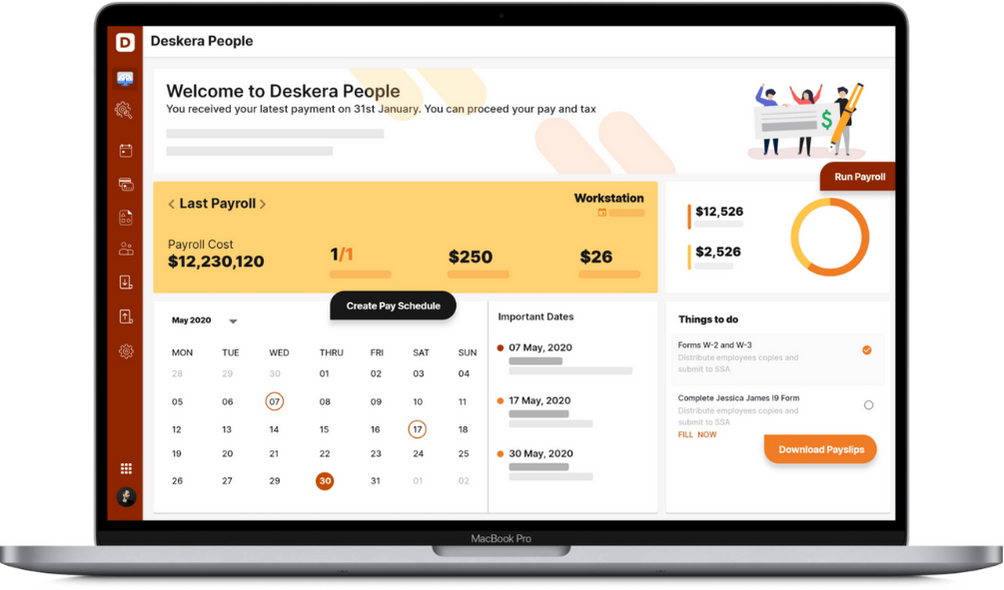There were more than 4,764 fatal work injuries recorded in the United States in 2020. The rate of work injuries and fatal accidents has just gone up over the years. If you are an employer looking to cover your employees under an insurance program, you must know about the workers’ compensation. Or, if you are an employee looking to learn about worker’s compensation, this article is all you need. This article will tell you all you need to know about workers’ compensation.

This article covers the following:
- What is workers’ compensation?
- How does workers’ compensation work?
- What are the steps to claim workers’ compensation?
- What are the most common causes of workers' compensation?
- What are the benefits of providing workers’ compensation to your employees?
- What is PA workers’ compensation?
- What are the legal rights of the employees under workers’ compensation?
- Workers’ compensation during Covid 19.
- FAQs- Workers’ compensation for employees.
- How can Deskera assist you?
What is Worker’s Compensation?
Workers’ compensation, aka worker’s comp systems, was established to provide partial medical care and income protection to injured or become ill from their job. These systems also provide employers incentives to reduce work-related injury and illness.
A majority of employers buy workers’ compensation insurance coverage through private insurers or state-certified compensation insurance funds. Larger employers may also have the option to self-insure. These systems are complex and governed by state laws.
It is effectively a disability insurance program for workers, providing cash benefits, healthcare benefits, or both to workers who suffer injury or illness due to their jobs.
How Does Workers’ Compensation Work?
Communicating clearly with an injured employee will make the workers’ comp claims process much easier for both you and your employee. Here’s what you can expect to happen, and what you’ll need to do after an employee reports an on-the-job injury:
Train employees to report a work injury immediately
You and your injured employee usually have a limited amount of time to file a workers’ comp claim. As the employer, it’s typically your responsibility to file a claim with your insurer, but first, you must have your employee fill out paperwork, like documentation of the date, time, and circumstances of the injury. As part of the claims process, you’ll probably need to provide:
- A completed claim form and other documentation to your insurer
- A report of injury to your state workers’ compensation board
Instruct your employee to seek medical treatment
As soon as possible, you seek medical treatment for their injuries depending on the severity of the injury, this could happen before or after you begin the claims filing process.
The health care provider who attends to the employee will fill out a medical report after treatment. In most cases, the employee’s provider will need to send that report directly to the insurance company. This information will be used to determine what medical bills are related to the workers’ comp claim.
File the claim with your workers’ comp insurance carrier
In most cases, you’ll be responsible for filing the workers’ compensation claim with your insurance company. You’ll send in the employee’s claim form to your insurance provider and any forms and documentation to your state’s workers’ comp board. Note that in many states, you’ll have to report any workplace injuries, even if the employee isn’t filing for workers’ compensation benefits.
Wait for the insurer to approve or deny the claim
Once you’ve filed all of the paperwork, your insurance carrier will decide whether the employee’s claim is valid. If the insurance provider approves the claim, the employee can either accept the payment offered by the insurer or negotiate either a lump-sum settlement or a larger structured settlement. In the event a claim is denied, your employee has the right to appeal that decision.
Prepare for your employee’s return to work
Hopefully, your injured employee will eventually be able to return to work. In the meantime, you may need to hire a temporary replacement. You may also consider offering an injured worker modified duties to get them back on the job faster.
Once an employee has recovered enough to return to work, they’ll need to notify you and your insurance company. If the employee suffered permanent injuries, the insurance company might have to pay permanent disability benefits.
Step to Claim for Worker’s Compensation
Here are a few steps to claim for workers' compensation:
Step 1: The employee reports an injury to their employer
As an employer, make sure your employees know that if they become ill or injured on the job, they need to inform you as soon as they are able. Typically an injured employee is required to provide written notice, and most states set deadlines for reporting injuries.
A variety of injuries may qualify, such as slipping on a wet floor in the office and breaking an arm, or developing carpal tunnel syndrome from repetitive typing. Some injuries may require immediate treatment at an emergency room or urgent care.
Others may require a doctor’s visit for diagnosis and medical care. Depending on the state and the insurer, the employee may need to seek non-emergency treatment from a medical provider that’s part of the insurer’s network in order to receive benefits. With injuries or illnesses that surface over time, the employee should report the illness as soon as possible.
Step 2: The employer guides the injured worker on necessary paperwork and next steps
Once you’ve been notified of an employee injury, you’ll need to provide your injured worker with information on their rights and workers’ comp benefits, as well as their return to work.
In most states, you’ll give your employee a workers’ comp claim form to fill out and return to you. This form will detail the nature of their injury, along with where, when, and how it occurred.
You may also need to have your injured employee fill out the first report of injury form that you’ll submit to your state’s workers’ compensation board. Which forms are required and who is responsible for completing them depends on the state where you and your employee are based, the type of illness or injury, and the insurer.
It’s a good business practice to include workers' comp insurance information in your new hire employment packet to assure your employees know their rights if they’re injured on the job. If you fail to provide this information, you could face a lawsuit.
Step 3: The employer reports the injury and files the claim form
Usually, the employer is responsible for sending the claim form and all supporting documentation to the workers’ comp insurance carrier. Still, the employee’s doctor will also need to submit a medical report.
Additionally, you may be required to report the injury to your state's division of workers' compensation or workers' comp board. This may apply to all workplace injuries, even if your employee is not seeking workers’ comp benefits.
Step 4: The insurer approves or denies the claim
Once the claim is filed, the insurer will either approve or deny the claim.
If a claim is approved:
Once a claim is approved, the insurer will inform the employer and contact the employee with payment details. At this point, the employee and their workers’ compensation lawyer (if any) may:
- Accept the insurance company’s payment offer, which may cover the costs of medical bills, medicine, disability payments, and a portion of lost wages
- Negotiate for a lump-sum settlement or larger structured settlement
If a claim is denied:
If your workers’ comp insurer denies benefits, the employee has the option to:
- Request a reconsideration from the insurance carrier
- File a formal appeal, usually through the state workers’ comp board or commission.
Step 5: The employee returns to work
Once an employee has recovered from an injury and can return to work, they’re required to provide written notice to both their employer and the insurance. Depending on the severity of the injury, the insurance company may have to pay permanent disability benefits.
Many employers choose to implement a formal return to work program to get workers back to work and productive as quickly as possible. These programs may involve offering an injured worker modified duties or training employees on other skills if they cannot resume their regular responsibilities.
What are the Most Common Causes of Workers’ Compensation?
Here are few common causes of workplace injuries that increases the need of workers' compensation:
Strains and Sprains
Strains and sprains are by far the most common on-the-job injury for workers. Strains and sprains usually happen when employees are carrying or handling materials.
According to the Travelers Companies, 1.5 million workers submit workers’ compensation claims for sprains and strains every year in the United States. Indeed, strains and sprains that happen on the job account for 30% of the total workers’ compensation claims.
Cuts and Punctures
The most common cause of workplace injuries depends on the type of business as well as the industry. For example, sprains and strains are the most common injuries for all industries except small businesses.
However, for small businesses, cuts and punctures are the most frequent type of workplace injury, followed by sprains and strains. In the manufacturing and construction industries, eye injuries are the most common reason for workers’ compensation claims.
Cuts and punctures can be caused by sharp tools or common office equipment. Jagged edges, altered equipment, glass, knives, box cutters, and unsafe flooring can also cause cuts and punctures.
Fingers and hands are the most likely parts of the body to suffer cuts and punctures. Unfortunately, many workers cannot continue to work when their hands are injured because they cannot type, drive, or hold objects.
Severe Cuts and Lacerations
Many cuts are somewhat easily treated and may not require significant time off of work. Severe cuts are much more serious and often require ongoing medical treatment.
Severe cuts penetrate the skin, and can even injure muscle and tendons. In extreme cases, reconstructive surgery might be required. Severe lacerations can result in amputations or permanent muscle and nerve damage. When an employee loses the use of their arm or leg, they may not be able to return to work.
Additionally, infections are always a possible danger for deep lacerations. Serious infections can cause brain damage, organ damage, and even death in severe cases. Common causes of deep lacerations include the following:
- Cuts from broken glass or other sharp objects
- Gashes caused by heavy machinery
- Avulsions when a machine or other object tears skin away from the body
- Abrasions that look like road rash from an on-the-job motor vehicle injury.
Overuse or Repetitive Stress Injuries, Including Back Injuries
Some workers’ compensation injuries are not immediately obvious. They do not happen based on one traumatic event; instead, these injuries happen over a period of time. These disorders are also known as overuse injuries.
With repetitive stress injuries, repeated physical strain causes musculoskeletal diseases. The following types of overuse injuries are incredibly common and can happen in any workplace:
- Tendonitis
- Knee injuries
- Back pain
- Herniated disks
- Sciatica
- Runner’s knee
- Torn rotator cuffs in the shoulder area
- Tennis elbow
- Carpal tunnel syndrome
- Degenerative joint diseases
- Nerve damage
- Back injuries
- Shoulder injuries
- Rotator cuff injuries
Many workers do not notice the injury until the damage is severe. The muscles when it comes to overuse injuries have become damaged long before a worker first notices a twinge of pain in many cases.
Unfortunately, many Georgia employers automatically deny workers’ compensation claims for overuse. They may claim that they got injured outside of the workplace.
However, when you can prove that repetitive motions done continuously as part of your job description caused your injuries, you will be entitled to workers’ compensation benefits.
Fractures
A fracture happens when a bone splits or fractures. Broken bones can take a significant time to heal. If you suffered a broken bone in a workplace accident, speaking with a skilled lawyer can help.
Compound fractures could require multiple surgeries and extensive physical therapy. Common types of workplace fractures include the following:
- Leg fractures
- Foot fractures
- Skull fractures
- Spinal disc fractures
- Arm fractures
- Rib fractures
The causes of workplace injuries are important to know, to help occupational safety professionals create new strategies and protective methods. Without knowing their causes, injuries could be more challenging to minimize.
In 2019 the top causes of workplace injuries included:
- A bodily reaction to overexertion (such as when lifting objects or performing repetitive motions), caused 31.0% of workplace injuries
- Falls, slips, and trips, caused 27.5% of workplace injuries
- Contact with objects or equipment caused 25.8% of workplace injuries
- Transportation incidents, which caused 5.6% of workplace injuries
- Violence and other injuries caused by a person or an animal caused 5.0% of workplace injuries
- Being exposed to harmful environments or substances caused 4.2% of workplace injuries.
Here are a few ways to avoid these common causes of workplace accidents/injuries
Employers and employees should work together to minimize workers’ comp injuries and, therefore, workers’ comp claims. Fortunately, several safety and prevention strategies can help.
Use Personal Protective Equipment (PPE) and Rotate Workers
Wearing personal protective equipment is an important safety strategy for those working in hazardous areas or with hazardous materials. This can be enhanced by frequently rotating workers, so they spend less time in hazardous situations. The longer a worker is in a dangerous environment, the higher the risk of injury.
Create Buffers or Eliminate Hazards
Erecting a buffer between hazards and employees can also minimize health risks. If possible, removing the hazard altogether is the optimum way to ensure safety. If the hazard is an element such as a gas or liquid, providing proper ventilation and disposal methods can reduce injury and illness.
Provide Training and Create Safety Committees
Most importantly, the best prevention strategy is frequently training employees and employers. Creating a learning environment focused on safety promotes a healthy and safe workplace.
In addition, it can be helpful to create a safety committee or group comprised of employees, employers, and occupational safety specialists that can analyze potential risks and find solutions before there’s a problem.
Apart from just having the satisfaction of helping your employees in their worst, here are a few more benefits of providing workers’ compensation.
Benefits of Providing Workers’ Compensation to Your Employees
Here is a list of benefits of worker's compensation that you should not miss out on:
Regulatory compliance
If an employee suffers a work-related injury that is deemed compensable and the employer does not have workers’ compensation ins. In that case, the employer will then be required to reimburse the state for the direct costs of the injury as well as interest, penalties, attorney fees, and more.
An uninsured employer may also face the risk of civil litigation by the injured employee and the risk of criminal charges by the state. In short, it opens up the business owner to many financial hurdles.
Prevents lawsuits
The Pennsylvania Workers’ Compensation Act does not allow employees to bring lawsuits against employers for workplace injuries if the employer provides the necessary workers’ compensation benefits. Business owners will know that any form of litigation can negatively affect a business.
It can drain company finances, time, and energy. Litigation can also impact the relationship between the business owner and the employees, customers, vendors, and investors.
A lawsuit can tarnish your company’s reputation and has been known to lower a company’s value and sales and even force companies out of business. Workers’ compensation is a significant safety net when it comes to lawsuits.
Financial benefits
By complying with the workers’ compensation insurance requirements, a business avoids paying fines and reimbursement when an accident happens. Workers’ compensation insurance also protects employers from direct lawsuits by injured employees, eliminating the risk of high fees and potential settlement.
Protects employees
Your business’s most vital assets are the employees. Workplace injuries have far-reaching effects on finances, lost productivity, retraining costs, and more. A safer work environment with fewer injuries is better for both employees and employers.
With fewer injuries comes lower workers’ compensation costs. That saving has become a great incentive for employers across the nation to create safer workplaces for their employees. Safety training and safety programs can help employers save on workers’ comp costs.
What is PA Workers Compensation?
It is one of the most searched questions on Google. And it’s not tricky. PA Workers' compensation is Pennsylvania Workers’ compensation. As you may have guessed, yes it’s an act meant for Pennsylvania. Here is a little about the act.
In 1915, the Pennsylvania Legislature enacted the Pennsylvania Workmen's (Workers') Compensation Act (act). The statute charges the Department of Labor & Industry (department) and the Bureau of Workers' Compensation (Bureau) to carry out the administrative and appeal obligations defined in the act and specify compensation for employees injured.
As a result of employment without regard to fault. Amendments eventually merged the compensation for injuries and occupational diseases into this act. The statute defines the benefits available to Pennsylvania workers, the conditions under which benefits are available, and the procedures.
The workers' compensation system protects employees and employers. Employees receive medical treatment and are compensated for lost wages associated with work-related injuries and disease, and employers provide for the cost of such coverage while being protected from direct lawsuits by employees.
Workers' compensation coverage is mandatory for most employers under Pennsylvania law. Employers who do not have workers' compensation coverage may be subject to lawsuits by employees and to criminal prosecution by the commonwealth.
Some employers are exempted from workers' compensation coverage. Exemptions include: people covered under other workers' compensation acts, such as railroad workers, longshoremen, and federal employees; domestic servants (coverage is optional); agricultural workers who work fewer than 30 days or earn less than $1,200 in a calendar year from one employer; and employees who have requested, and been granted, exemption due to religious beliefs or their executive status in certain corporations.
In Pennsylvania, Employers' compensation insurance through a licensed insurance carrier or the State Workers' Insurance in Pennsylvania Fund. in Pennsylvania, employers can apply to the bureau to seek approval to self-insure their liability. Self-insurance is granted by the bureau based on criteria established by the act and the department.
Employees are covered for the entire period of their employment. Therefore, coverage begins the first day on the job. Injuries or diseases caused or aggravated by employment are covered under workers' compensation, regardless of the employee's previous physical condition.
What are the Legal Rights of the Employees Under Workers Compensation?
The rights of the employees under the workers’ compensation act differ from state to state. However, there are few rights that are generally under every act.
- You have the right to file a claim for your injury or illness in workers' compensation court or the state industrial court.
- You have the right to see a doctor and to pursue medical treatment.
- If you are released to return to work by your physician, you have the right to return to your job.
- If you are unable to return to work because of your injury or illness, whether permanently or even temporarily, you have the right to some type of disability compensation.
- If you disagree with any decision by your employer, the employer's insurance company, or the workers' compensation court, you generally have the right to appeal that decision.
- You have the right to be represented by a lawyer throughout the process.
In understanding your rights to act, as an employee, it is just as important to understand your right to refuse certain requests or offers. For example, if you are injured and your employer encourages you to use your own health insurance to pay for your medical treatment, you have the right to say, "no."
And if your boss offers you some incentive in an attempt to persuade you against filing a worker's compensation claim, this is illegal. You have the right to say, "no."
The laws in each state provide that you can pursue a workers' compensation claim without fear of reprisal or harassment from your employer. If your employer makes it difficult for you to exercise these rights freely, the penalties imposed upon the employer can be quite severe.
It is illegal for your boss or supervisor to harass you at work or otherwise make it difficult for you to do your job if your filing of a worker's compensation claim is the motivation for that behavior.
Sometimes your on-the-job injury might have been caused by the negligence of a third party. Depending on the circumstances, this other person or entity may be a designer or manufacturer of a defective piece of equipment or perhaps the driver of a delivery truck.
If you are injured while at work due to the negligence of another party, you may have the right to bring a claim against that person or entity. These are known as "third-party claims." Typically, these claims are not filed in the workers' compensation universe. Rather, they take the form of civil lawsuits and are filed in state or federal courts.
Civil lawsuits for work-related injuries can typically seek additional personal injury damages that are not recoverable in a workers' compensation claim. For example, the benefits you receive in a workers' compensation claim are typically intended to reimburse you for your medical expenses and lost wages.
You are usually not allowed to seek compensation for pain and suffering. In a third-party claims are generally allowed to seek compensation for pain and suffering, which is a category of "non-economic" damages.
In California, there is something like California State Disability Insurance, learn more about it here.
Workers’ Compensation During Covid-19
If a worker believes they contracted COVID-19 at their workplace, they have a right to workers’ compensation benefits. You should encourage workers to notify their employer and file a workers’ compensation claim if they think they contracted COVID-19 at work. When you become aware of the illness, you should provide your employee the workers’ compensation claim form.
New Law on COVID-19 Presumptions
On September 17, 2020, the governor signed Senate Bill 1159. This new law creates two rebuttable presumptions that COVID-19 illnesses contracted by specific categories of employees are work-related and therefore eligible for workers’ compensation, including medical treatment.
- The first presumption applies to COVID-19 workers’ compensation claims filed by peace officers, firefighters, first responders, and health care workers.
- The second presumption, for employers with five or more employees, applies to employees who test positive for COVID-19 during an outbreak at the employee’s specific place of employment. An outbreak occurs when a set number of employees – depending on the number of employees at the workplace – test positive for COVID-19 during a continuous 14-day period.
- Employers are required to report employees infections at a specific workplace to their workers’ compensation insurer, regardless of whether the infection appears to be work-related.
- This is a rebuttable presumption meaning that an employer can present evidence regarding measures they have taken to reduce the potential transmission of COVID-19 in the workplace.
This bill limits the risk of employers being liable for claims where the infection did not occur at work by tailoring the presumptions to those first responders and frontline health care workers whose work puts them at the greatest risk of exposure and other employees where there is a demonstrated and verifiable COVID-19 outbreak at their worksite.
Take a look at the benefits that Texas provided to its employee during peak Covid 19.
FAQs Workers’ Compensation for Employees
Here is a list of frequently asked questions that many employees ask, will answer a few of your questions too.
1. How long do I have to work to be covered under workers’ compensation?
-You are covered from the first day on your job.
2. How do I know if the company I work for is covered by workers’ compensation?
-The law requires any business with three or more workers, including regular part-time workers, to have workers’ compensation insurance. Coverage can be verified by going to www.sbwc.georgia.gov and clicking on "How Do I verify an employer’s workers’ compensation insurance coverage"
3. When should I report an accident that happened on the job?
-You should report any accident occurring on the job to your employer (boss, foreman, or supervisor immediately. If you wait longer than 30 days, you may lose your benefits.
4. What should I do about the doctor?
-Your employer is required to post information identifying medical care providers. Your employer may satisfy this requirement in one of the following ways:
- Post a Traditional Panel of Physicians consisting of a minimum of six doctors. You may choose any one of the six. However, the Board may grant exceptions to the required size of the panel where it is demonstrated that six physicians or groups of physicians are not reasonably accessible.
The panel must include one orthopedic physician and not more than two industrial clinics. Where possible a minority physician must be included. You may make one change to another doctor on the list without the permission of your employer.
2. Post the name of the Workers’ Compensation Managed Care Organization (WC/MCO) certified by the Board which your employer has contracted with to provide medical services. Your employer must give you a notice of the eligible medical service providers and post a 24-hour toll-free number for the managed care organization.
A managed care representative will assist you in scheduling an appointment with the eligible medical provider of your choice. You may make one change to another eligible physician at any time without the permission of your employer.
3. Who pays for the doctor?
-Your company’s workers’ compensation insurance carrier will pay for your authorized medical treatment if the treatment was for an on-the-job injury.
4. What medical treatment will be paid for?
-All authorized doctor bills, hospital bills, physical therapy, prescriptions, and necessary travel expenses if the injury or illness was caused by accident on the job. You may also be entitled to medical and vocational rehabilitation.
5. When do I get my benefits?
-You are entitled to weekly income benefits if you are unable to work for more than 7 days. Your first check should be mailed to you within 21 days after the first day you missed work. If you miss more than 21 consecutive days, you will be paid for the first week.
6. How much will my weekly benefits be?
-You will receive two-thirds of your average weekly wage, but not more than $675.00 per week for an accident that occurred on or after July 1, 2019.
7. What if I am able to return to work but can only get a lower-paying job as a result of my injury?
-You will receive a reduced benefit based upon your earnings for a maximum of 350 weeks from the date of injury. This benefit will not exceed $450.00 per week if your accident occurred on or after July 1, 2019.
8. How long will I receive weekly benefits?
-If your accident occurred on or after July 1, 1992, you are entitled to benefits for up to 400 weeks. If your injury is catastrophic in nature, you may be entitled to lifetime benefits.
In certain circumstances, your benefits may be reduced after you have been released to return to work with limitations or restrictions or suspended if you are released to return to work with no limitations or restrictions.
9. What if my injury keeps me from getting a job?
-Under the law, if you sustain a catastrophic injury, you are entitled to receive help in getting another job or learning to do another job.
10. What kind of benefits will I receive if I have a permanent disability?
-You will receive weekly benefits based on the type and extent of your permanent disability. The authorized treating physician determines ratings based upon Guides to the Evaluation of Permanent Impairment fifth edition, published by the American Medical Association.
11. What benefits will I receive if I lose my leg, arm, or other parts of my body?
-You will receive benefits based upon an amount set by law. For example, if you lost an arm or leg, you will receive benefits of 225 weeks.
12. Can I be compensated for the loss of sight or hearing?
-Yes.
13. Can I receive benefits If I have lost the use of a part of my body?
-Yes, benefits are based upon the extent of loss of use of a part of your body as determined by the authorized treating physician.
14. If I die as the result of an on-the-job accident, what benefits will my dependents receive?
-Your dependents will receive two-thirds of your average weekly wage or a maximum of $675.00 per week for death on or after July 1, 2019. Your dependents are your surviving spouse, children, or dependent stepchildren. A widowed spouse with no children is limited to a total amount of $270,000.00 unless he or she remarries or cohabitates in a meretricious relationship.
15. Can I be paid social security and workers’ compensation at the same time?
-Yes, but social security benefits may be reduced.
16. What if I don’t receive my worker’s compensation?
-You must file a claim to protect your rights within one year from the date of your accident. This is accomplished by filing Form WC-14 with the State Board of Workers’ Compensation.
17. How do I file a claim?
-The State Board of Workers’ Compensation will provide you with Form WC-14 to file a claim.
18. What happens after I file a claim?
-If you do not receive any benefits, you may request a hearing before the State Board of Workers’ Compensation at the above address. A hearing is like a trial in the courts of Georgia.
Your claim will be decided by an Administrative Law Judge who listens to both sides of the claim and determines what benefits, if any, you should receive. The judge’s decision will be based on the law and the facts involved.
19. When will the hearing happen?
-The hearing generally will be scheduled within 60 days where time the judge receives the Form WC-14.
20. Where will the hearing take place?
-The hearing will generally be held in or near the county where you were injured.
21. Do I have to have a lawyer to represent me at the hearing?
-Everyone has the right to represent him or herself. However, your employer may be represented at the hearing by a lawyer. You may need help from a lawyer in order to present your claim properly.
22. What if I want a lawyer but I don’t know one?
-You may call the Atlanta Bar Association Lawyer Referral Service by dialing (404) 521-0777. You may also call the Georgia Bar Association at 1-800-334-6865 or check your telephone directory for the number of a local lawyer referral service.
23. How much will my lawyer charge me?
-The attorney fee will be based on an agreement between you and your lawyer, subject to the approval of the State Board of Workers’ Compensation if the fee is greater than $100.00. No fee greater than 25% of the employee’s weekly benefits or settlement shall be approved.
24. Civil penalties
-Any person who knowingly and intentionally makes a false or misleading statement for the purpose of obtaining or denying benefits or payment under the law may be assessed a civil penalty of not less than $1,000.00 or more than $10,000.00 per violation.
The Board may assess a penalty of not less than $500.00 nor more than $5,000.00 per violation for an employer’s failure to be insured for workers’ compensation.
25. Criminal penalties
-In addition to civil penalties, a person, firm, or corporation who makes false and misleading statements or representations may face criminal sanctions by imprisonment not to exceed 12 months.
Any employer who refuses or willfully neglects to have workers’ compensation insurance shall be guilty of a misdemeanor.
26. Enforcement division
-An Enforcement Division has been established at the State Board of Workers’ Compensation. You may report fraud, including the failure to secure workers’ compensation coverage, by calling (404) 657-7285.
How Can Deskera Assist You?
As a business, you must be diligent with employee leave management. Deskera People allows you to conveniently manage leave, attendance, payroll, and other expenses. Generating payslips for your employees is now easy as the platform also digitizes and automates HR processes.

Key Takeaways
- Workers’ compensation aka worker’s comp systems were established to provide partial medical care and income protection to employees who are injured or become ill from their job.
- Train employees to report a work injury immediately.
- Instruct your employee to seek medical treatment.
- File the claim with your workers’ comp insurance carrier.
- Wait for the insurer to approve or deny the claim.
- Prepare for your employee’s return to work.
- Strains, sprains, cuts, punctures, severe cuts, lacerations, overuse, or repetitive stress injuries, including back injuries and fractures, are some of the common causes of worker’s compensation.
- An uninsured employer may also face the risk of civil litigation by the injured employee and the risk of criminal charges by the state.
- The Pennsylvania Workers’ Compensation Act does not allow employees to bring lawsuits against employers for workplace injuries if the employer provides the necessary workers’ compensation benefits.
- By complying with the workers’ compensation insurance requirements, a business avoids having to pay fines and reimbursement when an accident does happen.
- With fewer injuries comes lower workers’ compensation costs.
- In 1915, the Pennsylvania Legislature enacted the Pennsylvania Workmen's (Workers') Compensation Act (act).
Related Articles















